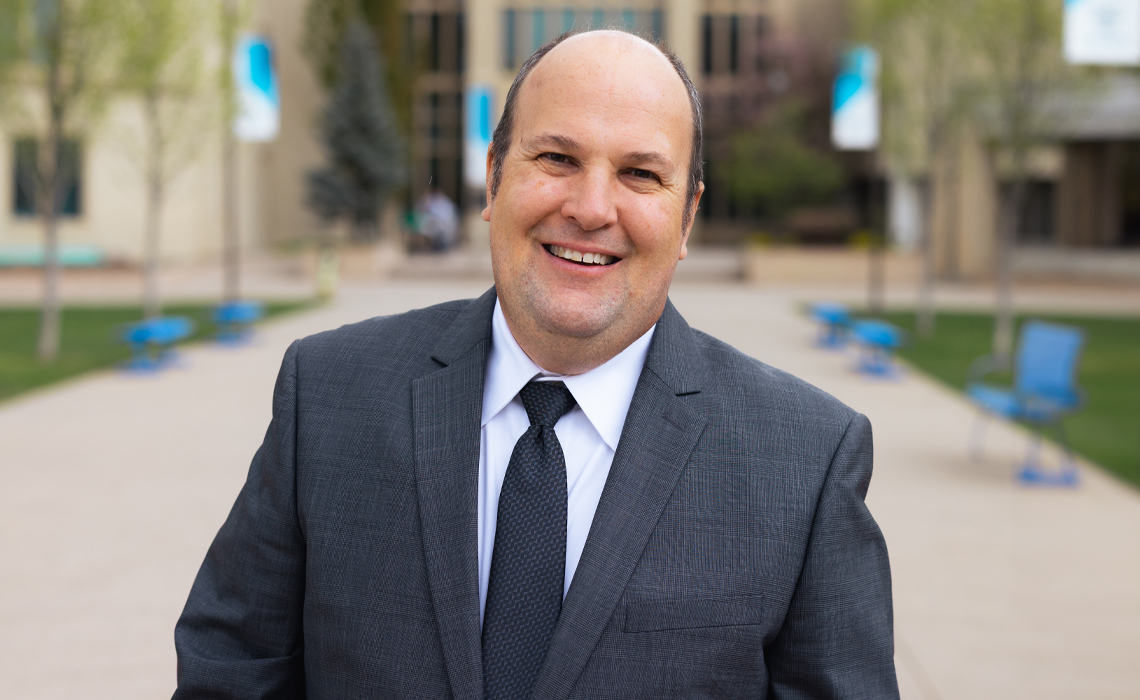Sociology: From surviving to serving

"Pay it forward."
Meet Derek. Resilient. Empathetic. Determined.
Hometown: Osoyoos, B.C.
Degree: Arts | Major: Sociology
For Derek Morgan, who has been studying at Mount Royal University for the better part of 25 years, convocation has been a long time coming. And the journey has been far from smooth.
Morgan joined the school in 2000 as a student in the Disability Studies program. A few years prior, he had been diagnosed with a brain tumour. After undergoing four surgeries, he was left with significant cognitive challenges.
“I was very entrenched in the disability lifestyle and I thought, ‘Well, okay, let's just complement that with academia,’ and then I could utilize that awareness and articulate it and be productive … If somehow I could take what I've done, what I’ve experienced and then pass that on, maybe others could build on that and tailor it to their own goals and achievements,” Morgan says.
Morgan says one particular challenge he experiences due to his cognitive impairment is issues with his executive functioning. Sometimes it takes longer for him to get through a typical course load. In one case, he had to take the same class five times before passing it.
In 2013 the Disablities Studies learning paths were moved under the sociology umbrella. Morgan was admitted to the B.A. program in 2016 and has been working steadily toward his degree since then, with a brief break during the pandemic.
“From time to time, Derek would face hurdles in completing a particular course or requirement. But he would always persevere and find ways to make it through the class. He never asked for exceptions, no matter the challenge,” says Dr. Mary-Lee Mulholland, PhD, chair and professor, Department of Sociology and Anthropology.
“I was always impressed with how he was able to connect sociology theory and concepts to his own experiences of cognitive impairment.”
One of Morgan’s other sociology professors, Dr. Tom Buchanan, PhD, teaches multiple daily sessions of the same class. He says while the class is one most students dread, Morgan sat in the same lecture several times a day to ensure his success.
“His attitude was always very positive and his questions were always excellent. He was a model of resilience,” Buchanan says.
Over the years, there was one professor who made such an impact, he got a tattoo to honour one of the biggest takeaways from her class.
“One of the projects in Dr. Nancy Doetzel, PhD's classes, social movement development, was dissecting the movie Pay It Forward. It helped provide a lot of solace knowing that I wasn't the only one experiencing what I was experiencing,” he says.
“So one of the takeaways from that project was paying it forward using my experience and then helping other people who are experiencing cognitive impairment through brain injury.”
Doetzel says Morgan was an amazing student who invested more in his assignments than was expected and put in his own research into topics being discussed in class to be able to contribute meaningfully.
She also says Morgan’s heart of gold was evident from the get-go.
“From the first class, Derek demonstrated his goals to make this world a better place. For his first altruism assignment, he went out and did more altruistic acts than he was requested to do … he was very excited about the concept of repaying one kind act done to him with three more kind acts towards others. He said he felt very uplifted when being altruistic,” she says.
“Derek is a happy person who likes to pass on joy to others when he greets them. He is friendly with whoever crosses his path and often hugs fellow students and professors.
Morgan’s altruistic mindset has helped him persevere in the face of adversity.
“Financial gain won't sustain motivation through adversity, because there's no money in the world that can compensate for the frustration that you experience from failing repetitively,” he explains, adding that being kind to yourself and others goes a long way.
“I try to be as empathetic as possible. Everyone has their own developmental issues that contribute to their makeup. Be open and malleable and flexible as much as possible.”
There’s absolutely no slowing down for Morgan after graduation. Next, he plans to lean on his own experiences to write a book that other people with brain injuries or disabilities can use as a blueprint for overcoming hardship.
His parting words for new students: get to know your educators.
“I mean that’s pivotal,” he says.
“When students get to know their professors, then they really know what's possible and what flexibility is possible for them and what accommodations can be made.”

